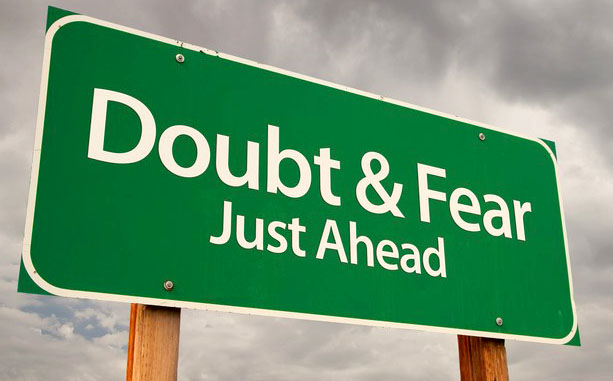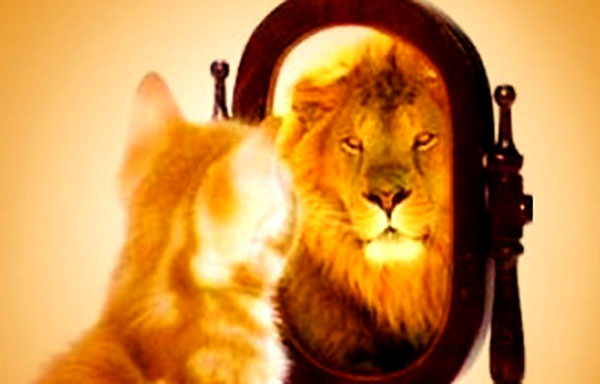Self-Doubt: A Love Story
“Sometimes the hardest part of the journey is believing you’re worthy of the trip.”
– Glenn Beck, Talk Show Host The Christmas Sweater
The screen went blue. I had clicked “End Test,” completing my National Counselor Exam. I had faced fear, self-doubt and 200 psychological questions but I really felt like I had rocked it. I was certain I’d passed and eagerly sought the paper confirmation of my long educational and spiritual journey. But I went to the desk and there was no print out.
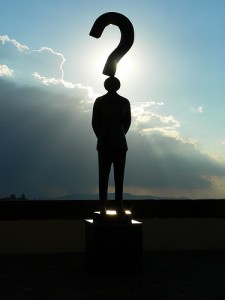 “I’m sorry sir,” the kind old lady said, “There’s been an error.”
“I’m sorry sir,” the kind old lady said, “There’s been an error.”
I had expected to know the result, to have my doubts assuaged. Instead I am marooned with my worry on the island of tech support for 3-5 days. Immediately, I doubted myself anew. I clicked too fast! I should have made sure I had fully finished!
Last time we read about four people who surmounted their doubts and changed the world. Wednesday at 6pm I felt like Van Gogh shortly before selling his only painting; a screw up or the victim of life’s unpredictable cruelty. Even after Van Gogh had sold “The Red Vineyard” his self-doubt remained and he succumbed a few months later (Feloni, 2014). In no way do I plan to end my life—and my ears are still attached—but the next few days could be doubt heavy, if I let them be.
I approve of self-doubt but I run counter to the norm. “Curiously,” noted editor and educator Jamie McKenzie (2006), “the culture has treated doubt as a predominately bad state of mind or action, with many a dictionary and thesaurus offering mostly negative meanings and synonyms.” In reality, there is value in a healthy amount of self-doubt, just like a healthy amount of confidence.
Positive psychologists, educators and other professionals agree that doubt can be beneficial, but defining our “healthy amount” is the tricky part. I find myself in that struggle as I type this. Maybe you are, too. We all struggle with self-doubt alone. Let’s learn to do it right together.
In Doubt of Doubting
“We cannot think of being acceptable to others until we have first proven acceptable to ourselves.”
– Malcolm X, Muslim Minister
Well-being Instructor Michelle McQuaid (2015) warns that “feelings of self-doubt often cause us to become defensively pessimistic in an effort to avoid taking on new challenges…self-sabotage our efforts [or] drive  us to overachieve in an effort to prove ourselves wrong and risk burning ourselves out.” Over-active self-doubt can make us procrastinate or become work-aholics or that person who can never take a compliment for a truly well done job. It is that paralyzing, chilling grip on our ability to act. While already potentially hazardous, if self-doubt lingers, and becomes part of us, it can actually foster low self-esteem, depression or anxiety.
us to overachieve in an effort to prove ourselves wrong and risk burning ourselves out.” Over-active self-doubt can make us procrastinate or become work-aholics or that person who can never take a compliment for a truly well done job. It is that paralyzing, chilling grip on our ability to act. While already potentially hazardous, if self-doubt lingers, and becomes part of us, it can actually foster low self-esteem, depression or anxiety.
This doubt is what McKenzie calls “bad doubt” because it “springs from a negative spirit – a destructive skepticism that dwells on issues and problems” to self-protect from the feared moment when it all may “come tumbling down.” Living in the grip of self-destructive skepticism can foster Van Gogh’s unfortunate state; even when our self-doubt is proven wrong, our self-esteem has been eroded to the point that it’s too late.
But “the truth is nature has wired your brain with these uncomfortable feelings for the practical purpose of guiding your behavior…motivate you to improve your performance and avoid making the kind of mistakes associated with having too much self-confidence” (McQuaid, 2015). McKenzie concurred, calling such bravado “a form of blindness or closed-mindedness” over “good doubt,” which is self-questioning in “a positive spirit of constructive skepticism” (2006).
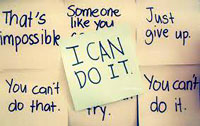 Back in April I began my journey to the exam with McKenzie’s constructive skepticism—I had thought I wasn’t ready and my practice tests confirmed it! I didn’t quit, though. I built a regimen of prayerful study. Harrison Ford may have done similar when “after his first small movie role, an executive took him into his office and told him he’d never succeed in the movie business.” I’m sure he was angry and full of self-doubt, but he used the professional critique to build a sixty year career which has touched our lives.
Back in April I began my journey to the exam with McKenzie’s constructive skepticism—I had thought I wasn’t ready and my practice tests confirmed it! I didn’t quit, though. I built a regimen of prayerful study. Harrison Ford may have done similar when “after his first small movie role, an executive took him into his office and told him he’d never succeed in the movie business.” I’m sure he was angry and full of self-doubt, but he used the professional critique to build a sixty year career which has touched our lives.
I’ll never tell him the odds, but maybe Ford was a lousy actor back then. If Ford had given up—or had not used the doubt to become a better actor—the world may never have soared with Han Solo and Indiana Jones’s fedora may just have been another hat.
Partnering with our Doubts
“Doubt is the beginning not the end of wisdom.”
– Proverb attributed to George Iles, Author
McQuaid urges that “acknowledging our self-doubts and taking small steps that lead to small successes is an effective way to build our confidence and shift our beliefs about what we’re capable of doing.” Well used self-doubt can actually “lower our levels of stress and improve our levels of effort, persistence, resilience, and ability to achieve our goals,” if it helps us build a better us (2015).
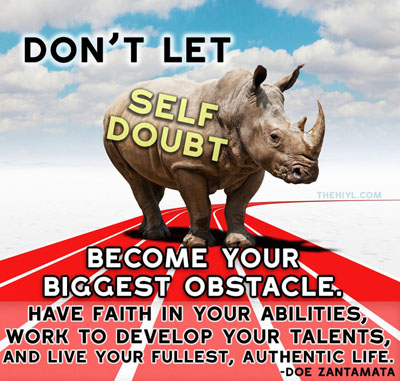 Harnessing our self-doubt takes three key actions in pursuit of “psychological agility” which is the practice of embracing the right emotion, in the right situation for the right outcome (McQuaid, 2015). The first is a spiritual action. There’s also a social action and a personal action.
Harnessing our self-doubt takes three key actions in pursuit of “psychological agility” which is the practice of embracing the right emotion, in the right situation for the right outcome (McQuaid, 2015). The first is a spiritual action. There’s also a social action and a personal action.
I was afraid and I doubted my abilities; for the spiritual person this is a beneficial self-perspective when seeking our Higher Power. (Hit the search box for many articles on Health and Spirituality). For me, Jesus is Lord. He and I had many heart-to-hearts as I studied, and even during the test. I remember what the Apostle Paul told Timothy as he doubted himself “…God gave us a spirit not of fear but of power and love and self-control,” (2 Timothy 1:7, ESV). Throughout my study I had many opportunities to down myself, but I chose to love and teach myself; that’s healthy doubt management. Right now I could have “a spirit of fear” about my exam results but I chose instead to remember God’s presence during the exam, my certainty of his guidance to the right answers and that sense of his power—knowing that he led me to pass—rather than let destructive skepticism steal my joy. Both of those choices take self-control.
Socially, we need to surround ourselves with supporters. We read about how Henry Ford, herald of the automotive age, almost gave up on his dream. Ford managed his doubt, but key to his success was that “Ford was finally able to find a partner who had faith in him” (Feloni, 2014).
Personally, every moment of doubt is a chance to build self-compassion, which is a mindset of forgiving ourselves for our short comings and showing ourselves loving understanding to promote our own growth. McQuaid said “studies suggest” this leads “to ever higher levels of success…helps to improve our optimism, leaves us feeling happier and acting in ways that are good for ourselves and others” (2015).
Our self-doubt can destroy us, or it can build us; either way it will bring fear. McQuaid, and McKenzie both agree that healthy living relies “less on feeling fearless and more on acknowledging your self-doubt and having the courage to move forward and do it anyway.”
If they’re not enough, just ask me, or Edison, Newton, Ford, Van Gogh, Paul, Timothy, Han Solo or Indiana Jones. We all doubt, we all can be better. We all can live victorious.
__________________________________________________
Feloni, R. and Lutz, A. (2014) 23 Incredibly Successful People Who Failed At First. Business Insider. Retrieved from: http://www.businessinsider.com/successful-people-who-failed-at-first-2014-3?op=1
McKenzie, J. (2006) Good Doubt and Bad Doubt. QUestioning.org. Retrieved from: http://questioning.org/jan07/doubt.html
McQuaid, M. (2015) Wish You Could Banish Self-Doubt? From Functioning to Flourishing. Psychology Today. Retrieved from: https://www.psychologytoday.com/blog/functioning-flourishing/201504/wish-you-could-banish-self-doubt

